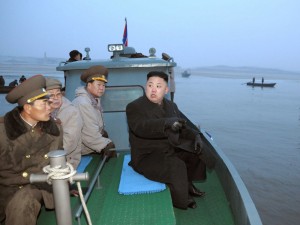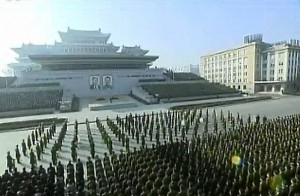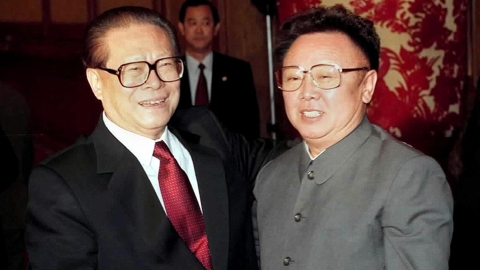World News – The sides are starting to align and the line will soon be drawn in the sand. China has taken a position of support for North Korea. That is all that was needed to give North Korea some balls behind their talk. It is going to wind up the USA and the UK vs the world who is sick of the USA’s imperialistic nature.
 There was never any clue from the outside that a cheap apartment on the 16th floor of a tower block in the Chinese city of Dandong was in fact North Korea’s lifeline to the outside world.
There was never any clue from the outside that a cheap apartment on the 16th floor of a tower block in the Chinese city of Dandong was in fact North Korea’s lifeline to the outside world.
But for nearly a decade, 1602 Huiyou Gardens was the Chinese office of an organisation described by American investigators as a “key financial node in North Korea’s weapons of mass destruction apparatus”.
Since it founded its Chinese branch in 2004, the Kwangson Bank, otherwise known as the Foreign Trade Bank, helped channel billions of pounds of valuable foreign currency to Pyongyang, money that was used to finance North Korea’s nuclear weapons and ballistic missiles programs.
So when the Chinese authorities shut down the branch office last month, 10 days after the United Nations Security Council imposed fresh sanctions on North Korea, it seemed a clear sign that Beijing had finally lost patience with Kim Jong-un’s truculent, unpredictable, and increasingly belligerent regime.
“It is a big hit for North Korea! China is implementing the UN Security Council resolution,” wrote one Chinese government-owned newspaper in Hong Kong.
Several visits last week confirmed that the branch office, conveniently close to the North Korean consulate, was indeed deserted. Neighbours professed amazement that the axis of evil had been just next door.
Meanwhile, at least two of China’s big state-owned banks were ordered to shut down their own accounts with Kwangson, whose imposing Soviet-style offices are in the heart of the North Korean capital, Pyongyang, next to Kim Il-sung Square.
Dandong, a grimy city of nearly 800,000 people that is separated from North Korea by the Yalu river, is Pyongyang’s only major link to the outside world.
Full of smugglers, spies and military officers it often feels as if the normal rules do not apply in this shady border town.
Around 70 per cent of the 6 billion dollars of annual trade between North Korea and China flows through the city, and there is, perhaps, another 9 billion dollars of black-market trade.
A key oil pipeline here provides the rogue state with 80 per cent of its fuel needs, and China, which is Pyongyang’s only remaining ally, demands a high price for the privilege.
Dandong has also traditionally been the channel for the valuable foreign currency that North Korean leaders spend to acquire the imports they personally covet. Their shopping list includes luxury food and fine wine, Apple iMacs for Kim Jong-un, 30, as well as Chinese-built missile launchers and components for their nuclear arsenal.
But with tensions on the Korean peninsula at their highest for years, it is widely being suggested that the cosy relationship between China and North Korea is unravelling.
“No one should be allowed to throw a region and even the whole world into chaos for selfish gains,” said Xi Jinping, the new Chinese president, in comments seen as a sharp rebuke to Pyongyang.
If China really were to cool its relationship with its neighbour, this could dramatically change the situation on the peninsula. Indeed, without China’s support throughout its entire existence, North Korea’s regime might have collapsed long ago.
“China’s attitude towards North Korea has changed unprecedentedly since February,” said Shi Yinhong, a professor of international relations at Renmin University, adding that a decision last week to halt Chinese tourism across the border at Dandong was another clear signal of displeasure from Beijing to Pyongyang.
Bonnie Glaser, of the Centre for Strategic and International Studies in Washington, said: “The Chinese expected Kim Jong-un, who was brought up in the West, would come in and make some economic reforms – and, as a young man, would  show some respect for his elders and for the people giving him food. But he has been nothing but defiant.”
show some respect for his elders and for the people giving him food. But he has been nothing but defiant.”
She also said that a high-ranking Chinese military officer and the head of a major Chinese think tank had both told her last week that China was “taking action” against the North.
When Kim Jong-Un took over after the death of his father Kim Jong-il in late 2011, Beijing had expected him to follow the Chinese model of reforming the economy while keeping the political system under firm control.
But North Korean officials have fretted that embracing capitalism would not only undermine the ideology that keeps them in power, but also grant China dangerously unfettered access to their market.
In Dandong, Chinese frustration with the North’s intransigence is palpable. Billions of renminbi (or yuan, or hundreds of millions of pounds) have been poured into a joint economic zone that has now stalled.
The skeleton of what would have been a giant suspension bridge between the two countries stands forlornly at the site. Dozens of Chinese built skyscrapers, in anticipation of a boom, are empty and now, apparently, sinking into the soggy river banks.
Yet despite their frustration with Pyongyang, however, investigations in Dandong by The Sunday Telegraph last week suggest that the Chinese still prefer the devil they know. North Korea, even with its endless bluster and war threats, remains a country with which it can work, and represents a crucial buffer against what China sees as an American attempt to “encircle” it. If the regime collapsed, China would either be forced to take over the running of the country, or risk the possibility that it is subsumed into South Korea, bringing pro-western forces right to the Chinese border.
Which is why, on a single morning last week at the main branch of the Bank of Dandong, 11 people had no difficulty in transferring money from within China to the capital of North Korea despite the new UN sanctions.
While Kwangson bank may have lost its branch office, it is now possible instead to send money through this smaller local, but still state-run, bank.
Inside the branch, Wu Junhong, an assistant to the manager, held up a completed transfer slip. “Look,” she said, “We just sent across €15,000 to Pyongyang – it’s that easy.
“It takes one day, and you can send as much money as you like, there is no upper limit. And we offer five different currency options: dollars, euros, yen, Korean won and Chinese yuan.”
Ms Wu added that it was also still possible to transfer money from other banks in the city, but that the cash would be rerouted through the Bank of Dandong.
“You can use an account anywhere to send money to North Korea. It will just take you slightly longer and they will charge you for it.”
Before the raid that closed the Kwangson Bank’s office last month, account holders are said by some to have been tipped off, enabling them to come to withdraw their money in advance before it was frozen.
Wang Yuangang, a Chinese businessman in Dandong with a Kwangson account, said the closure had only been “an inconvenience”.
“I only had a tiny bit of money in the account,” he said. “Of course my business has been affected by what is going on, but not because there have been any sudden changes. It is only because the development of the economy has been very slow on the Korean side.”
Despite China’s public protestations, trade from Dandong continues to flourish. Each day, scores of lorries queue up outside the city’s customs house to transport grain, fertiliser and containers of goods into North Korea. And the city remains a magnet for rich North Koreans.
“They buy everything as soon as it is released,” said a young salesman at a store selling Apple products. “They buy the most expensive and best items. Some customers will come in and buy 40 or 50 iPhone 5s or iPads to take back with them.”
The Chinese are also accused of turning a blind eye to sanctions against what is now the North Korean economy’s only money-earning export – weapons. The country still produces ageing Soviet-era technology that finds black market buyers in some of the more bankrupt African nations, but much of it gets intercepted during routine inspections of North Korean ships.
During one interception in South African port of Durban in 2010, however, officials discovered North Korean tank parts and other military equipment, apparently bound for the Congo, that had been loaded behind sacks of rice in the port of Dalian in north-east China. Diplomats said it was suspicious that the parts were not spotted by Chinese customs agents – and believe that such illicit trade may still be going on.
“One of the main effects of the UN sanctions regime has been to authorise weapons seizures, but that will remain a largely ineffective measure until the Chinese implement it,” said a former Western diplomat.
And although the newest round of United Nations sanctions specifically ban the sale to North Koreans of luxury items including jewellery, gemstones, and pearls, the shops that line Qi Jing street in Dandong reported a brisk trade with customers from across the nearby border.
“We sell them necklaces like this one,” said a saleswoman at China Gold, pointing to a delicate floral filigree, studded with gems and priced at the equivalent of $5,000. “The North Koreans who come here are usually government officials or businessmen and they are really rich.”
Indeed, while few people have even heard of the sanctions in Dandong, even fewer seem to care about them.
At the Bank of Dandong, Mrs Wu laughed at the suggestion that the sanctions might have stopped the flow of money. “How is that possible?” she asked.
“Business is still going on. We have lots of people every day.”
By Malcolm Moore, Dandong

